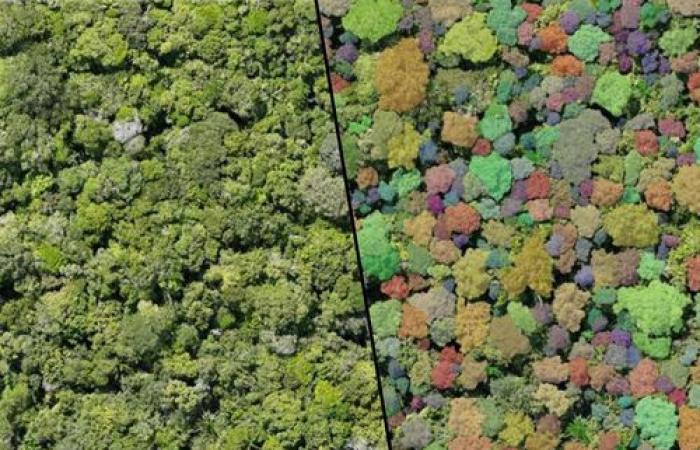The research work of professors from the University of Montreal and Polytechnique Montréal, supported by IVADO – the artificial intelligence research and transfer institute – contributed to the victory of the Limelight Rainforest team in the competition. XPRIZE Rainforest International, held in Brazil last July.
For this competition, the working group acting within the Limelight Rainforest team and led by Etienne Laliberté, principal researcher of the project and professor in the Department of Biological Sciences at the University of Montreal, developed a revolutionary method to identify and map canopy trees across large forest areas quickly and accurately.
Funded by IVADO, this innovative project enabled the research team to design new algorithms to map plant species and their phenological signatures based on the most recent developments in computer vision and deep learning. .
Drones and AI to map the canopy
Etienne Laliberté
Credit: Amélie Philibert, University of Montreal
The mapping solution developed by the working group relies on the use of drones equipped with high-resolution cameras to capture detailed images of the canopy. These images are then processed by a series of algorithms specially designed for the XPRIZE Rainforest competition: they make it possible to detect, segment the crowns and classify the trees forming the upper layer of the canopy.
“Participating in the XPRIZE Rainforest competition allowed us to push the boundaries of artificial intelligence [IA] applied to monitoring tropical biodiversity, explains Etienne Laliberté. Our technology makes it possible to map 100 hectares of rainforest in just a few hours, a feat that would be impossible to achieve with traditional on-foot land survey methods, which are thousands of times slower.”
This working group’s expertise in drone and AI tree mapping, combined with that of a multidisciplinary team made up of ecologists, indigenous scientists and taxonomists, allowed the Limelight Rainforest team to identify during from the final phase of the competition more than 250 species and 700 unique taxa in the animal and plant kingdoms from observations recorded in just 24 hours. The team thus noted that all the trees observed in the 100-hectare test area stored more than 3,000 tonnes of carbon in their stems and branches.
Innovative technology for the conservation of tropical forests
This technological advance opens up promising prospects for preserving tropical forests, ecosystems essential to regulating the global climate and maintaining biodiversity. Indeed, the joint use of AI and drone shots not only makes it possible to quickly map biodiversity by identifying tree species over vast areas in record time, but also to monitor ecological changes by detecting variations in species composition over time.
Its broad scope and the speed of execution it offers are therefore valuable elements for promoting sustainable forest management, since it is possible to obtain precise data that facilitates conservation planning, restoration and management. forest resources.
Making the protection of forest resources accessible and adaptable
The Limelight Rainforest project is part of a global effort to improve understanding of tropical forest ecosystems. “Tropical forests are home to incredible biodiversity, but we still know relatively little about it,” recalls Etienne Laliberté. Our technology will help us fill these gaps and promote conservation.”
But the impact of this project does not stop there: one of the key objectives was to provide an accessible solution, usable with consumer hardware and free software. “We designed our technology so that it can be adopted by research groups, forest managers and local communities around the world,” underlines Antoine Caron-Guay, research professional in Etienne Laliberté’s team and drone pilot during the competition.
“This project demonstrates IVADO’s commitment to supporting cutting-edge research with a tangible effect on some of the world’s biggest challenges. And this is just the beginning, underlines Luc Vinet, general director of IVADO. What makes this project even more remarkable is its accessibility, opening up immense prospects both in tropical environments and elsewhere.”
Moreover, Etienne Laliberté will travel to Ecuador at the beginning of 2025 to train indigenous workers in the Amazon who wish to use this technology to map tropical trees and offer their own rapid biodiversity monitoring services.
Business






